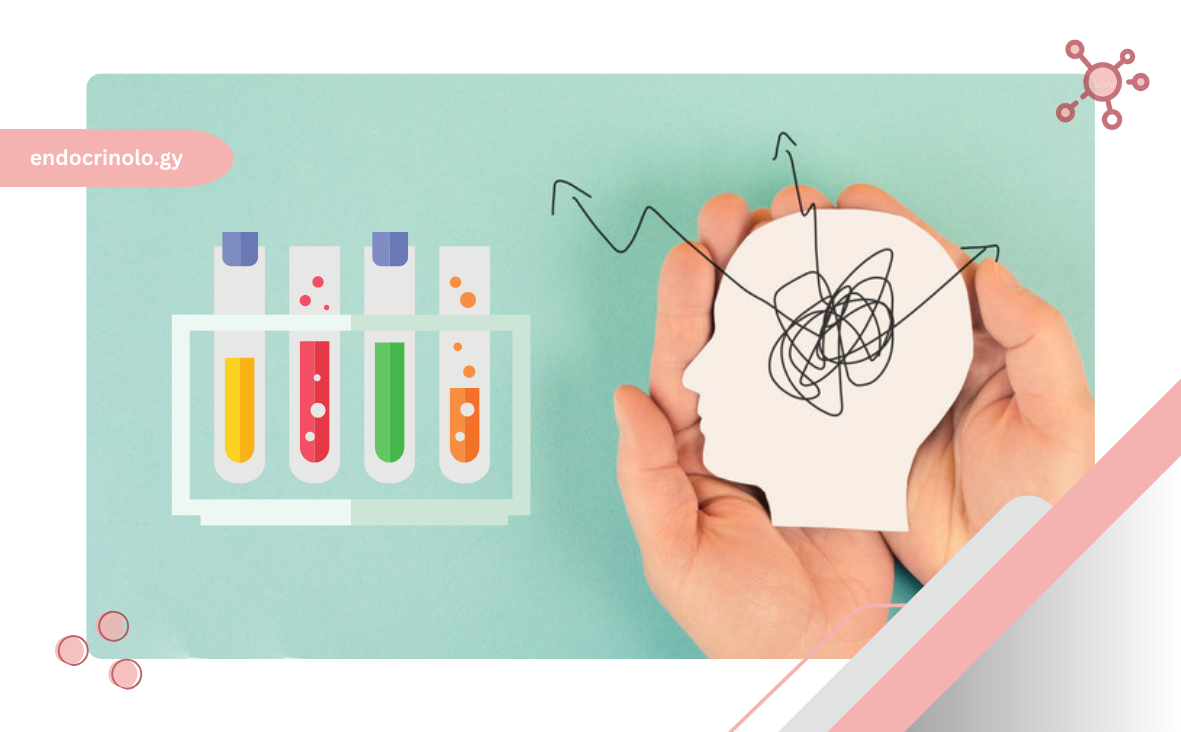The endocrine system has a significant impact on many aspects of the body's functioning. This includes metabolism, growth, sexual and reproductive health, and mental health.Because our emotions and moods are also under the strict control of hormones.
Mental health refers to emotional, psychological, and social well-being. It defines our thoughts, feelings, and behaviors.
Endocrine conditions, organs, and hormones that play a leading role in managing this area are:
- The thyroid gland and its hormones
- Cortisol
- Sex hormones – estrogen, progesterone, testosterone
- DIABETES MELLITUS
- Vitamin D and calcium
Thyroid hormones
Thyroid diseases, both in their hyperfunction and hypofunction conditions, are often accompanied by emotional and mental manifestations in addition to physical symptoms. These include:
- Easily irritable
- emotional lability
- Sudden and unexpected mood swings
- Anxiety, which may be accompanied by a rapid heartbeat, trembling, feeling weak and lacking energy
- Depression, which may be accompanied by moodiness, tearfulness, loss of appetite, and drowsiness.
In addition to these manifestations of the emotional sphere, mental disorders are also characteristic, which are more common in cases of decreased thyroid function. Namely:
- Difficulty concentrating
- Memory lapses (regarding recent events)
- loss of interest
Rapid changes in the concentration of thyroid hormones are particularly pronounced in these manifestations. on quality.
Fortunately, when the cause is truly thyroid dysfunction, symptoms will resolve as hormone levels are regulated, although this process may take some time.
If the symptoms are very severe or persist for too long despite the compensation of thyroid function, it is worth considering that the condition may have another underlying cause.In such a case, it is necessary to renew/continue the diagnostic search.
Cortisol
Cortisol, which is produced by the adrenal glands, is known as the stress hormone, so it's no surprise that it has significant connections and impacts on mental health.
Cushing's syndrome is characterized by a dramatic increase in the amount of cortisol in the blood. The cause of this syndrome, in turn, can be a benign tumor in the pituitary gland, adrenal gland, or other organ.
In addition to physical symptoms, an abnormal increase in cortisol levels may also manifest as mental disorders, such as increased irritability,Anxiety, mood swings, depression, decreased mental abilities.
In extremely rare cases, it may also be accompanied by psychotic manifestations.
A medical case is described where psychiatrists mistakenly treated schizophrenia for 10 years. After 10 years, Cushing's syndrome was diagnosed, appropriate treatment was provided, and symptoms resolved.
Neuropsychiatric manifestations are also characteristic of cortisol deficiency (Addison's disease). These may include depression, lack of energy, and sleep disorders.
Sex hormones
Most women know from their own experience how significant the impact of sharp fluctuations in sex hormones during the menstrual cycle has on mood and psychoneurotic functioning.
High levels of estrogen are associated with good mood, while low levels have the opposite effect.
In addition to the menstrual cycle, mental disorders due to sharp changes in sex hormones also occur during such episodes in a woman's life as: menarche (i.e. first menstruation), pregnancy, postpartum period and pre-menopausal period.
In men, testosterone is the leading sex hormone, which, along with other important functions, also affects the psychoemotional sphere. A decrease in its amount is also associated with mental disorders.
Testosterone levels in the blood naturally decrease with age, but in addition, a sharp decrease can occur with various medical conditions, trauma, or certain types of medications.
Thus, testosterone deficiency, known as hypogonadism, can be a cause of depression and other serious emotional problems in men.
diabetes
In the case of diabetes, the connections are two-way.
Mental health problems can worsen diabetes, and diabetes can also worsen mental health problems.
Fortunately, when one of them improves, it has a positive impact on the other.
For example, depression, which is accompanied by a loss of interest in oneself, work, and favorite activities, also affects diabetes self-management skills.
The statistics are as follows:
People with diabetes are 2-3 times more likely to experience depression than people without diabetes, and only 25 to 50% of those with depression are diagnosed and treated appropriately.
Psychotherapy, medication, or both are usually highly effective, and the earlier intervention begins, the more positive the impact on quality of life and diabetes management.
Without treatment, the disease gets worse.
The impact of stress is also worth noting.
Our lives are full of stressors. The effects of excessive stress can manifest as fear or anger, while physical manifestations can include heavy sweating or a rapid heartbeat.
Stress hormones produced at this time cause sudden changes in glycemia. This also includes stress resulting from various diseases or injuries.
A diagnosis of diabetes is also accompanied by anxiety states in 20% of cases.
The difficulties associated with coping with diabetes itself can lead to a state of diabetes distress. In such cases, there is a high risk that, due to disappointment and failure in the treatment process, a person will take control of the disease, which can lead to serious consequences.
Therefore, mental health management should be a priority component of a diabetes management plan.
Vitamin D and calcium
Although this issue has not been fully proven, some studies suggest that vitamin D deficiency worsens symptoms of depression and anxiety disorders, and screening for these conditions is necessary.
If a deficiency is detected, it will be corrected.
The same idea applies to calcium. Eating a diet rich in calcium has been associated with a reduced risk of depression and mental illness.
However, additional studies are also needed to confirm these connections.
Author: Elga Giorgadze (MD of Endocrinology)






